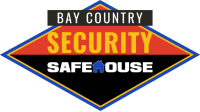
Choosing between keyless entry door locks and a traditional lock comes down to your lifestyle, your comfort with technology, and how much convenience or security you want from your home’s front door. Each option has its advantages, and the best choice depends on your unique needs. This blog from SafeHouse will give you a closer look at both options so you can decide which one is right for your home.
What Is a Smart Lock?
A keyless lock, or a smart lock, is an electronic locking system that allows you to lock and unlock your door without using a physical key. Smart locks work by enabling management through a smartphone application. Instead, you can use a keypad, smartphone app, fingerprint scanner, or even a voice assistant. Most smart locks connect to your home Wi-Fi or Bluetooth and can be controlled remotely. For example, if you’re out of town and want to let a neighbor in to water your plants, you can unlock the door from your phone or provide a temporary access code.
Many smart locks are also compatible with popular smart home systems like Amazon Alexa, Google Home, and Apple HomeKit. The Yale Access app is an essential component for setting up smart locks like the Yale Approach Lock. That means you can add your front door to automated routines, like locking all doors and turning off the lights at bedtime with a single voice command.
Benefits of Smart Locks
Smart locks are all about convenience. You can ditch the keychain entirely and never worry about losing your keys again, eliminating the need to carry keys. You can also assign different access codes to family members, guests, or service providers—and monitor exactly who’s coming and going. Some smart locks even send you real-time alerts or activity logs, so you’ll always know if someone opened the door.
In addition to smart locks, other smart home devices can be integrated to enhance overall home security and convenience.
Security is another advantage. Many smart locks offer advanced features like auto-locking after a certain period, biometric access, and two-factor authentication. Some models include built-in alarms that sound if someone tries to tamper with the keyless entry door or force entry.

What Is a Traditional Lock?
Physical locks use a physical key to open and close the door. The most common types of traditional door locks include deadbolts, knob locks, and lever-handle locks. These locks are purely mechanical, meaning they don’t rely on electricity or internet connections. They’ve been the standard for decades—and for good reason.
Traditional locks are generally simple, affordable, and reliable. You don’t need to worry about batteries, apps, or Wi-Fi. And in many cases, a high-quality deadbolt provides a very secure barrier against unwanted entry.
Benefits of Traditional Locks
One of the biggest advantages of traditional locks is their reliability. As long as you have your key, you can unlock your door—no need to worry about dead batteries or connectivity issues. They also tend to be easier to install and maintain, which makes them an attractive option for homeowners who don’t want to deal with tech.
In terms of security, many traditional residential locks are pick-resistant and bump-proof if you invest in a quality model. Plus, without electronic components, they’re immune to cyber threats.

Smart Lock vs. Traditional Lock: Which Is Better?
If you value convenience, remote access, and smart home compatibility, smart door locks may be worth the investment. It offers peace of mind with features like auto-locking, customizable codes, and real-time alerts. Just be sure to stay on top of battery life and security settings.
Keyless door locks keep homes safe by providing modern technology and convenience, making them increasingly popular in both residential and commercial settings.
On the other hand, if you prefer a no-frills approach that’s dependable, low-maintenance, and immune to technical glitches, a traditional lock could be the better fit. A well-made deadbolt still offers excellent home protection—and you won’t need to worry about tech failing at the wrong moment.
Ultimately, both types of locks can be secure and effective. The best choice depends on how you balance convenience, technology, and peace of mind in your daily life. Consider the security features of each option to make an informed decision.
Need Guidance?
When it comes to smart locks vs. traditional locks, there’s no one-size-fits-all answer. Both options offer strong security in their own way, and your final decision should reflect how you live, who needs access to your home, and how much control you want—whether it’s through a key or a tap on your phone. If you’re leaning toward convenience and connectivity, a smart lock could be the upgrade your home needs, allowing you to easily grant access to family members and service providers. If you prefer simplicity and tried-and-true reliability, a traditional lock will still serve you well. Smart locks can also be integrated with a home security system, enhancing convenience and security through features like remote access and monitoring.
Still not sure which option is right for you? Contact SafeHouse today for expert advice and installation services—we’ll help you secure your home with confidence.

